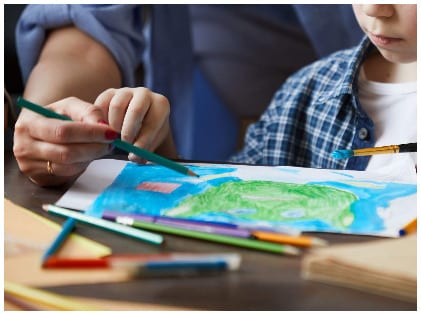What with the world on hold owing to the coronavirus pandemic across the globe, schools have been out and kids are at home being coached by their parents. Parents are learning to truly appreciate the task of teaching, as it isn’t as easy as one may think it is! Here’s how you can help your child concentrate and get started with their school work on the right foot – whether it’s with you at home, or whether they are returning to school after the lockdowns.
A Good Breakfast
 The first tip for better concentration starts with breakfast. For most families, mornings wind up being the most chaotic and scattered time of the day. During the morning it is hard for adults to focus and still get out of the door in time, and it is just as hard for kids. In the future, sacrifice the extra ten minutes of sleep for a calmer start to the day. Develop a solid morning routine and have a good breakfast. With a healthy breakfast, your child is fueled up for the day ahead and better prepared to concentrate on learning.
The first tip for better concentration starts with breakfast. For most families, mornings wind up being the most chaotic and scattered time of the day. During the morning it is hard for adults to focus and still get out of the door in time, and it is just as hard for kids. In the future, sacrifice the extra ten minutes of sleep for a calmer start to the day. Develop a solid morning routine and have a good breakfast. With a healthy breakfast, your child is fueled up for the day ahead and better prepared to concentrate on learning.
Reasonable Expectations
When it comes to kids, and adults too, personal interest tends to be the primary motivator for focus. This means your child is more likely to concentrate on a task that they enjoy than one that they don’t. Children usually learn to ignore distractions by five years old. Depending on the age of your child, their attention span is different as their cerebral cortex is still forming. It will require a lot of patience and research on your part to know how long to expect your child to remain focused on a new activity. Unreasonable expectations lead to frustrations on both parts, leaving both you and your child unhappy.
Schedule Breaks
 Children benefit from having breaks between activities. Structured activity is important, but so is scheduling downtime between tasks to ensure that your child is getting the most out of their time. Taking a break can work for both parents and kids alike, as the brain will benefit from a little time to recover and rejuvenate before tackling the next activity. This means no diving into homework the moment kids come home from school!
Children benefit from having breaks between activities. Structured activity is important, but so is scheduling downtime between tasks to ensure that your child is getting the most out of their time. Taking a break can work for both parents and kids alike, as the brain will benefit from a little time to recover and rejuvenate before tackling the next activity. This means no diving into homework the moment kids come home from school!
Set Up A Study Space
Having a specific spot dedicated to homework and studying comes with many advantages. Not only is it more organized, but it also offers an opportunity for kids to concentrate better as their brain associates that study space with learning over time. The earlier you can introduce such a space, the better. Take into account what helps your child when you select the study space, whether it should be around people or not, for example. Make the workspace comfortable yet functional.
Get Organized
While the workspace need not be magazine-worthy, it should at least be organized such that things are easy to find and within reach for both you and your child. Encourage your child to be organized and to put things into their places as they are done with them. Filing papers once they are done with them, putting away stationery, and having a functional system of using binders, folders, and plastic bins can all go a long way in helping your child develop habits that could help them concentrate all the way into adulthood.
Divide Bigger Tasks
 Homework can be overwhelming, especially for children under the age of nine. It is very helpful to teach your child the skill of breaking down a task into manageable ‘chunks’. This is a tool that will help them throughout their lives. Apply this technique not only to their worksheets, homework, and school tasks but even to chores that are expected around the home or other expectations. It is a very valuable skill to learn as your children will feel more able to accomplish tasks if they know how to start, and will not be easily intimidated by large projects or tasks.
Homework can be overwhelming, especially for children under the age of nine. It is very helpful to teach your child the skill of breaking down a task into manageable ‘chunks’. This is a tool that will help them throughout their lives. Apply this technique not only to their worksheets, homework, and school tasks but even to chores that are expected around the home or other expectations. It is a very valuable skill to learn as your children will feel more able to accomplish tasks if they know how to start, and will not be easily intimidated by large projects or tasks.
Above all else and in addition to these tips on improving your child’s concentration, do not forget to reward them and praise them for their efforts. When children get recognition for having invested effort in a task, they look forward to doing it again. It’s much the same for us adults, too, as anybody who has invested effort at their workplace and not been recognized for it will know. Your children are still developing and your job is to help guide them and support them. Don’t be too hard on yourself, just as you shouldn’t be too hard on them either. Enjoy the journey and make many memories. Learning is fun for the whole family!
